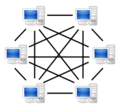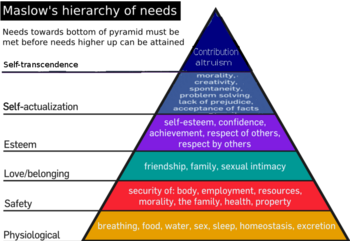Open collaborative design/What is the motivation to contribute?
These are some reasons why someone might want to contribute to the 'universal commons' of free and open designs:
- The fun and challenge of working on an interesting project with other like-minded people, wherever they might be in the world. Simple creative satisfaction (something rather lacking in this age of 'consumer culture'). It is very gratifying to work on a project that you are good at and thereby create something worthwhile. With software created in this way many people will give positive feedback and praise, and the creator(s) will enjoy respect for their efforts. Thus, contributing to open collaborative projects fulfils what Abraham Maslow considered to be one of Man's highest needs: being esteemed by yourself and others.
- As an individual, using and building upon existing components and assemblies from the universal commons will allow people to create things of a complexity and scale that they might not have otherwise have been able to achieve alone. By calling upon the rest of humanity to collaborate with you, you can achieve things in a fraction of the time.
- As an end user, desired products and machines can be individually customised to a high degree. This can be seen, for example, in the FireFox web browser, which is much more customizable than any closed-source web browser. Compared to traditional top-down economics, open collaboration makes a much less sharp distinction between consumers and producers; every consumer has the opportunity to participate in the design of the products they use, allowing them to get it just the way they like it.
- Other people may evolve your design further, which could benefit you as they might improve it or make additions you hadn't thought of.
- The concept of copyleft
 and Creative Commons changes the way people think about contributing their effort and time to creative open projects, as the contributions are for the benefit of everyone and anyone. Any contributions and improvements benefit all who have an interest in that project. The sense of community around open-source projects brings out Man's altruism; we give willingly to others whom we consider to be part of the same tribe as ourselves. As anyone who's ever been to Burning Man knows, once you are immersed in a gift economy for a little while, giving comes as easily as taking. A widely used design gives satisfaction to the creator knowing that many other people are getting practical use or joy from it, fulfilling another of the needs in Maslow's theory of motivation: that of self-transcendence, contributing beyond oneself.
and Creative Commons changes the way people think about contributing their effort and time to creative open projects, as the contributions are for the benefit of everyone and anyone. Any contributions and improvements benefit all who have an interest in that project. The sense of community around open-source projects brings out Man's altruism; we give willingly to others whom we consider to be part of the same tribe as ourselves. As anyone who's ever been to Burning Man knows, once you are immersed in a gift economy for a little while, giving comes as easily as taking. A widely used design gives satisfaction to the creator knowing that many other people are getting practical use or joy from it, fulfilling another of the needs in Maslow's theory of motivation: that of self-transcendence, contributing beyond oneself. - Reciprocity has long been identified (by Robert Cialdini and others) as one of the key ways to motivate anyone to do anything. People who benefit from open-source projects feel motivated to give back to the community.
- Social momentum - when a large enough group of people collaborate on a project, it creates a bandwagon effect. We are easily motivated to do something when we see that a lot of other people are doing it.
- Working on an open-project that may become a component of a wider technological ecosystem which moves modern society closer to being a truly advanced civilisation — rather than the compromised and highly unoptimised reality of the world today. One that is destroying the environment, not providing for the needs of the global population and with a significant percentage of people shackled to jobs and lifestyles they do not enjoy.
- Ultimately they will be similar reasons that motivate many hundreds of thousands of people who currently contribute to open-source software and similar collaborative endeavours world-wide. The bottom line is, regardless of why people contribute to open projects, the fact of the matter is that they do contribute.
A relevant quote from Benjamin Franklin  that becomes more plausible in the age of the internet and Open Source:
that becomes more plausible in the age of the internet and Open Source:
“... as we enjoy great advantages from the inventions of others, we should be glad of an opportunity to serve others by any invention of ours; and this we should do freely and generously.”
The outline of Advanced Civilization sketched on this wiki has dynamic synergy  between its elements. That people would do work without being paid may be mystifying in an economic context of scarcity, but in a condition of abundance people become more willing to contribute to others. Open collaborative design goes hand-in-hand with abundance. This is shown in Maslow's pyramid below.
between its elements. That people would do work without being paid may be mystifying in an economic context of scarcity, but in a condition of abundance people become more willing to contribute to others. Open collaborative design goes hand-in-hand with abundance. This is shown in Maslow's pyramid below.
Abraham Maslow's well-respected theory of motivation  - contributing to open collaborative projects fulfils the human needs to belong, to be esteemed, to know and understand, to actualize one's potentials and abilities, and to transcend oneself by contributing to something greater.
- contributing to open collaborative projects fulfils the human needs to belong, to be esteemed, to know and understand, to actualize one's potentials and abilities, and to transcend oneself by contributing to something greater.
It is interesting to note that scarcity-based economies focus on man's two lowest needs: security and physiological needs, while in a situation of Post-scarcity the lower needs are a non-issue, so the higher needs come into sharper focus.

